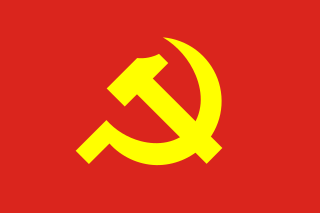
The Vietnamese Fatherland Front is an umbrella group of mass movements in Vietnam aligned with the Communist Party of Vietnam forming part of the Vietnamese government. It was founded in February 1977 by the merger of the Vietnamese Fatherland Front of North Vietnam and two Việt Cộng groups, the National Liberation Front of South Vietnam and the Alliance of National, Democratic and Peace Forces of Việt Nam. It is an amalgamation of many smaller groups, including the Communist Party itself. Other groups that participated in the establishment of the Front were the remnants of the Việt Cộng, the Vietnam General Confederation of Labour, the Ho Chi Minh Communist Youth Union and the Ho Chi Minh Young Pioneer Organization. It also included the Democratic Party of Vietnam and Socialist Party of Vietnam, until they disbanded in 1988. It also incorporates some officially sanctioned religious groups.
Nguyễn Hữu Chánh is the Vietnamese-American founder of anti-communist organization Government of Free Vietnam (GFVN), in which he served as its prime minister.
The Thổ ethnic group inhabits the mountainous regions of northern Vietnam, mainly Nghệ An Province southwest of Hanoi. Many Thổ speak the Tho language, which is closely related to Vietnamese. The Thổ population numbered 68,394 in 1999.

Tiền Giang is a province in the Mekong Delta region of southern Vietnam.

Mỹ Tho is the capital city, center of economics, education and technology of Tiền Giang Province, located in the Mekong Delta region of South Vietnam. It has a population of approximately 169,000 in 2006 and 220,000 in 2012. The majority ethnic group is the Kinh, and some of the Chinese, the Cham and the Khmer. Boat rides on the Mỹ Tho River are popular with tourists, and the city is known for hủ tiếu Mỹ Tho, a type of rice noodle soup.
Trần Văn Hữu served as president of the government of Cochinchina from 1948 to 1949, then as Prime Minister of the State of Vietnam from 1950 to 1952.
Long Tuyền is an ancient village in Cần Thơ city, Mekong Delta, Vietnam. The village is located on the southwest part of Cần Thơ River. It used to be a subdivision of Luc Ap before Cần Thơ Province was incorporated, then it became Binh Hung village during the reign of king Thiệu Trị of the Nguyễn dynasty. In 1852, following the arrival of Huynh Man Dat, a province chief who escaped from danger to this site, this village was renamed Bình Thủy.

The Chairperson of the National Assembly of Vietnam, formerly the Chairperson of the Standing Committee of the National Assembly of Vietnam from 1946 to 1981, is the legislative speaker of the Vietnamese parliament, the National Assembly. The parliament is, in the words of the constitution, "the highest representative organ of the people; the highest organ of state power ..., the sole organ that has constitutional and legislative rights".

Tomb of Gia Long, officially Thien Tho Tomb, is a royal tomb of the Nguyễn Dynasty which is located in the Hương Thọ commune of Hương Trà district, some 20 kilometres south of the city of Huế.

The Central Committee of the Communist Party of Vietnam established 1930, is the highest authority within the Communist Party of Vietnam elected by the Party National Congresses. The current Central Committee has about 175 full members and 25 alternate members and nominally appoints the Politburo of the Communist Party of Vietnam.
Phạm Bá Ngoãn, pen name Thanh Hải (1930–1980) was a modern Vietnamese poet. His pen name "Thanh Hải" literally means "Blue Sea" in classical Sino-Vietnamese.

The Catholic Bishops' Conference of Vietnam is the episcopal conference of the Catholic bishops of Vietnam. Initially created in 1960 for the South Vietnam and officially founded in 1980 after the unification of Vietnam, the CBCV is composed of all active and retired members of the Catholic hierarchy in Vietnam. The current president of CBCV is Joseph Nguyễn Chí Linh, Archbishop of Hue.
Nguyễn Hữu Thắng is a retired Vietnamese football player, who used to play and manage Sông Lam Nghệ An in Vinh. He is the former coach of the Vietnamese national team.
Lưu Hữu Phước was a Vietnamese composer, a member of the National Assembly, and Chairman of the Committee of Culture and Education of the National Assembly of the Socialist Republic of Vietnam.

Khương Hữu Điểu was a South Vietnamese Government ranking cabinet member and banking chief executive officer in the South Vietnam government from the mid 1950s to 1975.

Nguyễn Hữu Dũng is a Vietnamese footballer who plays as a Central midfielder for V-League (Vietnam) club Cần Thơ F.C.
Nguyễn Phúc Miên Định, born Nguyễn Phúc Yến (阮福宴), was a prince of Nguyễn dynasty, Vietnam.










